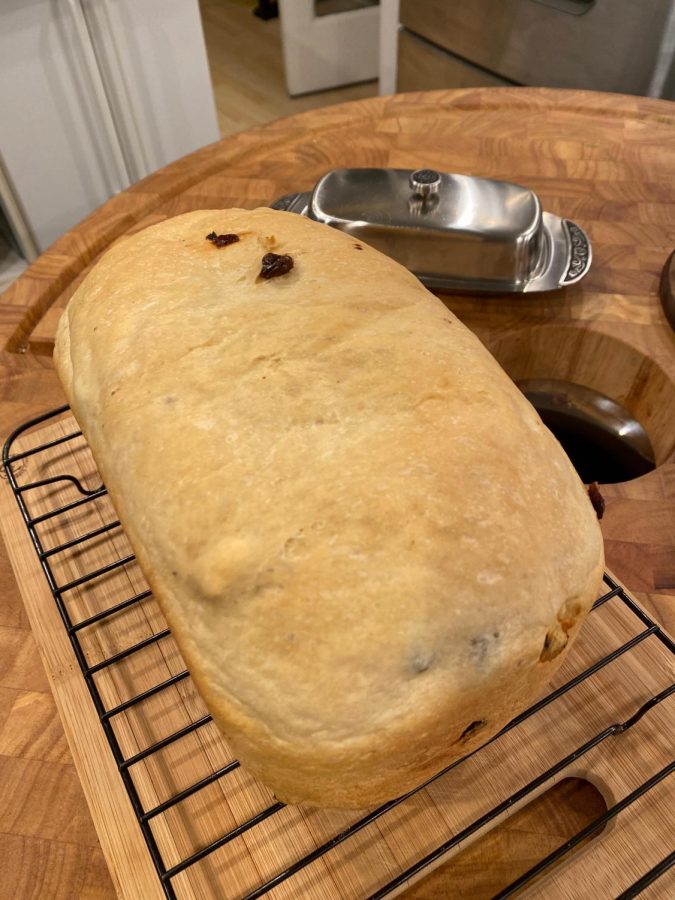Quarantine, or Change
How to pursue self-improvement during a pandemic
April 14, 2020
The arrival of my mother’s new bread machine has been the most interesting thing to happen to me all week. She bought it on a whim of self-improvement, hours upon hours foisted onto her hands as she sits at home, unable to work. Now, we’ve been making one loaf a day, a reminder that even during the apocalypse, it’s possible to carbo-load.
My mother isn’t the only one using her free time to learn a new skill. From writing challenges to planting okra, it feels like the entire world has felt the need to say how they would like to grow under quarantine. Personally, I’ve spent the past week going through my family’s attic, fighting dust bunnies tooth and nail.
Despite the novelty of all of these new pursuits, an uncomfortable tension lingers below the surface. This isn’t just a matter of dispensing with the mountains of free time we’ve been given.
Quarantine self-improvement projects are an attempt to control the uncontrollable situation that we’ve found ourselves in.
The desire for self-improvement is inextricably tied to the need for control. To control ourselves, to control the situations we find ourselves in and to control our futures.
The entire world has gone on a productivity kick due to a simple truth: Quarantine is scary. This is a sentence I never expected to type in an article I never expected to write in an age I never expected to live in.
It’s a game of “hurry up and wait.” I had to pack all my belongings from my dorm in a single day, when only a week before I was making plans for spring break. I told my closest friends goodbye without knowing when I’d see them again. I’ve watched the virus slowly take over my city while only being able to sit in my room.
Being quarantined is endlessly frustrating and endlessly mind-numbing. And so, while we can’t change the world, we can certainly try to change ourselves.
The relationship between self-improvement and control isn’t necessarily bad. My mother is delighted that I’ve been cleaning the attic, and there’s been some delicious raisin bread around the house lately. It only becomes toxic if we use our desire for self-improvement to punish ourselves for things we cannot control or because we believe our value comes solely from being productive.
Let me make one thing clear: You are under no obligation to work on self-growth during a plague. And, if you choose to attempt to pick up a skill during quarantine and never look at it again after, that’s completely fine too. Whatever keeps you sane. However, quarantine gives us the chance to consider how to make lasting changes in our own lives, and for those who want to, it is something we can capitalize on.
But how do people actually make lasting changes? How do people actually become healthier, more well-rounded, more organized people? As a person who wished to become all of these things when I came to college with no clue where to start, I’ve come to learn a few lessons.
First, there’s no such thing as “forcing” yourself to do something. There’s just what you are willing to do and what you aren’t, and the science of change is figuring out what actually motivates you versus what you think motivates you. Usually, that isn’t an abstract value, but more basic incentives that provide immediate rewards and consequences.
When I began running, I didn’t run for the sake of my health or for the joy of running. I ran because I wanted to be with my friend who I ran with. When I began writing for The Observer, I didn’t write for the sake of my education or for the joy of writing. I wrote because I knew there was a section editor who would email me if I ever failed to live up to my word.
On a related note, change demands community. John Green wrote that the best way to become a writer was to make gifts for people. Growth can’t happen in a vacuum. By sharing your pursuits with others, you’ll receive a channel of support and the chance to incorporate outside perspectives into your own views.
You see, growth is often a question of why, not how. The mechanics of using a bread machine aren’t that complicated. Cleaning the attic just took some Lysol wipes and elbow grease. Writing this article is simply putting words onto paper. If you can figure out your why, the how will follow.
With a global pandemic and seemingly endless free hours, we’ve been confronted with a large “why” lately. We’ve become strangers in our own lands. We’re physically isolated, yet mentally exhausted. We have no idea what to do, so we might as well just do something.
So, if you do choose to do something, don’t let your desire for control control you. Use this time to try to improve yourself if you’d like, but don’t punish yourself for missing arbitrary deadlines or failing to meet an invisible goal. Focus on what matters to you and the communities you value the most, and go from there.
Now, if you’ll excuse me, I think there’s still some raisin bread left in the kitchen.










